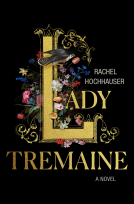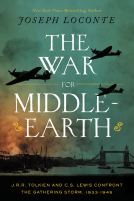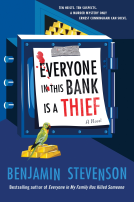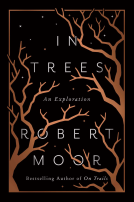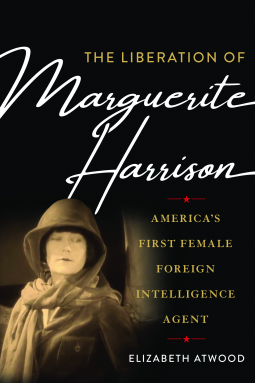
The Liberation of Marguerite Harrison
America's First Female Foreign Intelligence Agent
by Elizabeth Atwood
This title was previously available on NetGalley and is now archived.
Send NetGalley books directly to your Kindle or Kindle app
1
To read on a Kindle or Kindle app, please add kindle@netgalley.com as an approved email address to receive files in your Amazon account. Click here for step-by-step instructions.
2
Also find your Kindle email address within your Amazon account, and enter it here.
Pub Date Sep 09 2020 | Archive Date Nov 15 2020
Talking about this book? Use #TheLiberationofMargueriteHarrison #NetGalley. More hashtag tips!
Description
In September 1918, World War I was nearing its end when Marguerite E. Harrison, a thirty-nine-year-old Baltimore socialite, wrote to the head of the U.S. Army’s Military Intelligence Division asking for a job. The director asked for clarification. Did she mean a clerical position? No, she told him. She wanted to be a spy.
Harrison, a member of a prominent Baltimore family, usually got her way. She had founded a school for sick children and wangled her way onto the staff of the Baltimore Sun. Fluent in four languages and knowledgeable of Europe, she was confident she could gather information for the U.S. government. The MID director agreed to hire her, and Marguerite Harrison became America’s first female foreign intelligence officer.
For the next seven years, she traveled to the world’s most dangerous places—Berlin, Moscow, Siberia, and the Middle East—posing as a writer and filmmaker in order to spy for the U.S. Army and U.S. Department of State. With linguistic skills and knack for subterfuge, Harrison infiltrated Communist networks, foiled a German coup, located American prisoners in Russia, and probably helped American oil companies seeking entry into the Middle East. Along the way, she saved the life of King Kong creator Merian C. Cooper, twice survived imprisonment in Russia, and launched a women’s explorer society whose members included Amelia Earhart and Margaret Mead.
As incredible as her life was, Harrison has never been the subject of a published book-length biography. Past articles and chapters about her life relied heavily on her autobiography published in 1935, which omitted and distorted key aspects of her espionage career. This book draws on newly discovered documents in the U.S. National Archives, as well as Harrison’s prison files in the archives of the Russian Federal Security Bureau in Moscow, Russia. Although Harrison portrayed herself as a writer who temporarily worked as a spy, this book documents that Harrison’s espionage career was much more extensive and important than she revealed. She was one of America’s most trusted agents in Germany, Russia and the Middle East after World War I when the United States sought to become a world power.
Advance Praise
“The Liberation of Marguerite Harrison belongs among biographies of such women as Gertrude Bell and Margaret Mead. Atwood's narrative deserves a spot on the shelf between the bookends of WWI and the solidification of the Bolshevik experiment into a formidable Soviet state. A well-resourced contribution to the history of intelligence, with plenty of 'cloak and dagger.'” —Ann Todd, author of OSS Operation Black Mail: One Woman’s Covert War Against the Imperial Japanese Army
Available Editions
| EDITION | Hardcover |
| ISBN | 9781682475270 |
| PRICE | $32.95 (USD) |
Average rating from 13 members
Featured Reviews
 Terri W, Reviewer
Terri W, Reviewer
Marguerite was a fascinating person, sometimes in a positive way, other times negatively. I admired her linguistic ability to so quickly pick up languages like Russian and Persian. She was courageous to visit so many countries with squalid conditions.
The explanation of double agents being con men seems to fit her. Calm and stable, but can’t tolerate routine or boredom. No lasting emotional relationships. Exploitive of others. Skeptical about motives and abilities of others, but exaggerated notions of her own competence. She wanted everyone to listen to her foreign policy views, but was enamored with Russia. Many people were wary of her honesty, probably with good reason.
The people she met in her travels was amazing: an American owned a ranch breeding racehorses in China; a Swiss ran a dairy farm, also in China; a Dane owned the American Trading Company general store in an eastern Soviet city. Why did these folks prefer to live in harsh circumstances?
Very interesting look of the 1920s.
In this biography, Elizabeth Atwood tells us of the life and adventures of Marguerite Harrison, ‘America’s First Female Intelligence Agent’. In the book, a well-documented piece of research, we discover a woman of spirit, culture, and individualistic ways. However, one is left to wonder if the title, "The Liberation of Marguerite Harrison", refers to the two times Mrs Harrison had to be rescued from imprisonment due to accusations of espionage in the nascent USSR; from her bourgeois background; or from the constraints being a woman imposed on her.
Marguerite Harrison, we learn, was born in a well off, and well known, Baltimore family. Never a conformist, she learned to use her social skills to influence others, to get her way, to reach beyond the home. Following widowhood, she decided to become a journalist, before deciding she wanted more adventures and to experience directly the aftermath of WW1 in Europe. Using her connections, her polyglot skills, as well as her wiles, she managed to get herself a position as a spy in Germany. From then, she turned to Russia, a country undergoing deep changes which impacted her so much she may have turned coat. Despite repeated stints in Lubyanka Prison she remained interested in international affairs, possibly even going to the Middle East on additional missions disguised as cinema, but was never really trusted again.
I find the Afterword most truthful: “Marguerite Harrison was a failure”, both personally and professionally. The accounts her biographer Atwood has to draw on (Harrison’s own memoirs) are suspect, whilst all other documents show a very short-lived flare of grace. The premise of a woman breaking stereotypes is tempting, yet "The Liberation of Marguerite Harrison" demonstrates that being extraordinary does not necessarily mean being admirable.
Who would enjoy this
Mrs Harrison’s biography is the sort of book that I would often suggest for people who like well researched work. This is particularly true for those who like biographies, not gossip. This is an unabashed investigative paper, reliant on its many footnotes and data.
Additionally, Atwood’s work is clearly an example of a woman overcoming social and political ‘glass ceilings’. Readers with an eye for female history will definitely find it both enlightening and empowering.
Who should give this a pass
As already mentioned, Atwood herself recognises that this is not a story of success. Therefore, I would not suggest it for readers who idealise or, worse, romanticise spies. Even less so if they are looking for a feminist and idealist woman ‘pioneer’ to use as example.
Another group who may not enjoy this volume are those who want light, rousing, biography. Even with the best intentions, and the narrator trying to justify her heroine from time to time, Mrs Harrison’s life was not inspirational.
Conclusions and suggestions
Elizabeth Atwood presents us with a book more academic than general biography. The depth and constancy of reference use is admirable, as opposed to many other similar works. Also, the author tries very hard to remain a mere biographer, not a judge, which deserves praise. Sadly, she cannot help but try to ‘save’ her subject from time to time with inserts which show clear leaps of faith, as well as lack of notes. The most extreme – the suggestion that maybe it was Mrs Harrison who was trying to lure Solomon Mogilevsky, head of Russian Foreign Intelligence, into becoming an agent for the US – makes one cringe.
Nevertheless, I was pleasantly surprised by the awareness Atwood shows, at the end of the volume. It speaks of honest reporting, her own interests and expectations notwithstanding (although clear in between the lines). Bravo, because "The Liberation of Marguerite Harrison" dares show that the sort of person to life such extraordinary a life is not nice, and thoughtful, and trustworthy. Even more so, it exposes how such a choice of lifestyle would impact those around, for generations to come.
So yes, I applaud Ms Atwood on a coherent narrative report. After all, my main issue with the tome is the unbelievable account of certain events, that I understand derives from having to depend on Mrs Harrison’s clearly unreliable writings as source. In turn, this takes me to my main suggestions for biographies:
- When there are no sources for comparison of claims, explicitly remind the reader to take it all with a pinch (sometimes, a whole shaker-full) of salt.
- Don’t try to justify any actions or put forward theories, unless you have solid evidence to back you up.
- Be conscious of the format you are presenting to your reader. Notes and references as a section at the end of the book is good in traditional print format, but an e-reader would find that less comfortable than as footnotes on the page.
 Celia M, Reviewer
Celia M, Reviewer
This is a highly readable book. I read this book during the quarantine when people stated that they had problems concentrating and reading books. However, I was able to enjoy this book.
Like many foreign agents she came from upper society and had many political connections. She was a flawed person both on a personal and professional level. Perhaps as to be expected from a spy, Marguerite Harrison herself was a bit of a mystery. Often times there are discrepancies between her and other people’s version of events. There were enough of these differences in versions of events with multiple individuals to make me think that Marguerite Harrison herself often was the one who was lying.
Her motivations to be an agent seemed to be a desire for adventure rather than from patriotism. She started as her career in espionage by doing domestic spying and providing information on other Americans. I have read in other books that informants are often not reliable people.
The one weakness I found with the book is that the author does not make the case until the end of the book of why the reader should be interested in Marguerite Harrison considering she got caught as a spy and had many personal flaws.
Readers who liked this book also liked:
Sir Arthur Conan Doyle
Comics, Graphic Novels, Manga, Mystery & Thrillers, Teens & YA
Benjamin Stevenson
General Fiction (Adult), Humor & Satire, Mystery & Thrillers
L.M Montgomery
Children's Fiction, Comics, Graphic Novels, Manga, Teens & YA







